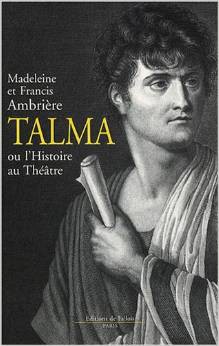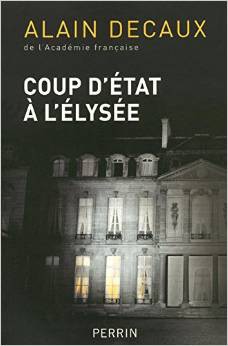History Prizes 2008
 FIRST EMPIRE PRIZE
FIRST EMPIRE PRIZE
Madeleine et Francis AMBRIERE, Talma, ou l’histoire du théâtre, Paris, Éditions de Fallois
This life of François-Joseph Talma is part history, part theatre, and part novel and as such rather like the hectic, contradictory, fascinating century in which the actor lived. Indeed the troubled, ever-changing times are brought to life again in the pages of this great actor’s story, from the last breaths of the Ancien Regime to the waning Restoration, with, of course, the Revolution and the saga of Napoleon that came between. The story (which was written using many previously-unpublished documents) comprises nearly a century of French social history. It is the account of a society caught between the desire for change and cautious conservatism. Their hopes, illusions and problems are not that far removed from our own: generational clashes, rivalries, struggles for influence and financial debt…
 SECOND EMPIRE PRIZE
SECOND EMPIRE PRIZE
Alain DECAUX, of the Académie Française, Coup d’État à l’Élysée, Paris, Perrin
The Coup d’Etat on 2 December 1851 greatly divided the French people. After more than 150 years, the time has come to put aside partisan perspectives and, through the sources and eye-witnesses, uncover the real historical truth of the event. Here the coup d’Etat is described hour by hour, indeed minute by minute. Alain Decaux narrates with skill and objectivity the long preparation for the coup, the four-day-long coup itself – sixty thousand troops against the barricades – and the final crushing of the insurrection. The reader becomes an eye-witness, almost a participant in the story. On 2 December 1851 two sentences were found stuck to the walls of Paris: “The Assemblée nationale has been dissolved. Universal suffrage is re-established.” Did the idea for the coup d’Etat really take shape in 1851, as an opportunistic reaction to the political situation at the time? Or was it not rather Louis-Napoleon Bonaparte’s carefully considered intention, fuelled by thirty years of exile? He had barely reached the ‘age of reason’ when he saw his uncle, Napoleon I, on the eve of leaving for Waterloo. His uncle considered him thoughtfully, after which Louis-Napoleon heard him murmur: “Maybe he is the future of my dynasty?”
 PRIZE FOR A BOOK IN A LANGUAGE OTHER THAN FRENCH
PRIZE FOR A BOOK IN A LANGUAGE OTHER THAN FRENCH
Edgardo DONATI, La Toscana nell’impero napoleonico. Tomo I e II, Florence: Editions Polistamp
The annexation of Tuscany to the French empire was exceptionally important in the history of the Italian peninsula. The ‘French’ government was to introduce methods of social control that had never before been seen in Tuscany and which would have a profound effect on the region. In his masterful two-volume book, Edgardo Donati has two main themes. The first is this attempt to introduce in Tuscany the fundamental structures of an ‘administrative monarchy’, with the creation and promotion of a professional class of administrators who would serve in a better-structured government. The second is a case-study of the work of Giovan Battista Nomi, the sous-prefet first of Arezzo and then of Pisa. These two areas of study (on the one hand the legislative activity, and on the other a case-study of the particular actions of an administrative elite) offer a striking vision of one of the Empire’s experiments. Regime changes are never easy. In this particular case, a small kingdom was absorbed (almost overnight) by a gigantic state structure and subjected to the will of a faraway power. Admittedly, opposition, as much to taxes as to the conscription, was fierce, but eventually the region was “pacified” by a subsequent change: the arrival of the emperor’s sister, Elisa, and the transformation into a grand duché.
